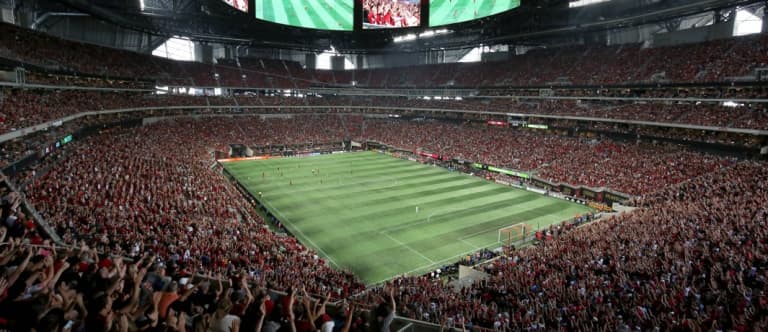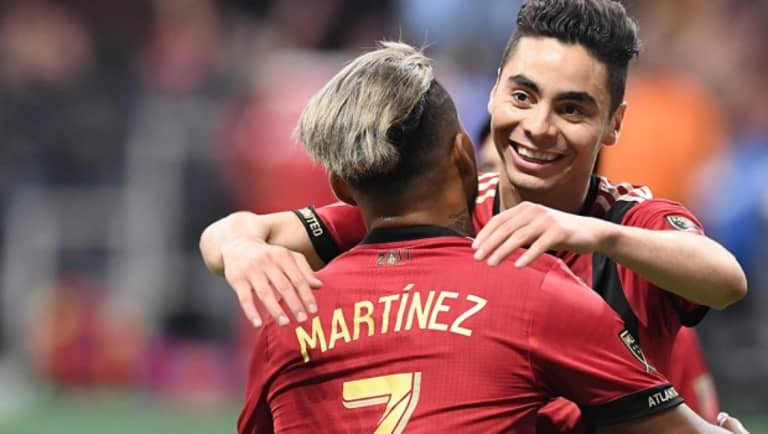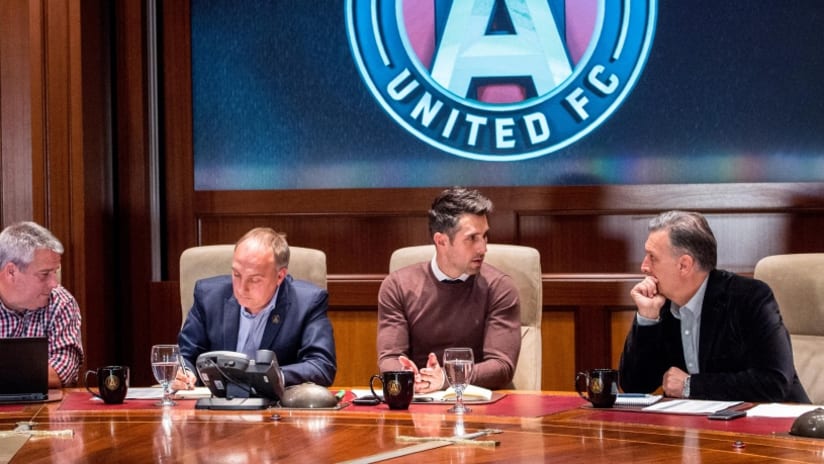From the moment he signed on as club president in September 2014, Darren Eales has always viewed Atlanta United through a global lens. For him, it wasn’t enough for the club to simply want to be a top dog in MLS or a cultural force in Atlanta, which will host the 2018 MLS All-Star Game presented by Target against Italian giants Juventus at Mercedes-Benz Stadium on Wednesday. He wanted to make them a player on the world stage.
To do so, he knew he had to run his biggest decisions through the framework of how they’d position the club internationally. Atlanta’s coaching search became less about finding someone who knew MLS and the domestic player than about hiring a manager who could give the team instant cachet in the transfer market. Their Designated Player targets weren’t established, marketable names, but young, exciting talents that could one day be sold to Europe for a large profit. Even the atmosphere at their home games became critical: If Atlanta could sell-out home matches and create an incredible environment, it wouldn’t just help with the bottom line, it’d make the club an easier sell to players considering moving to Georgia.
For a man who spent the eight years before he joined Atlanta working in the top tiers of English football, four with West Brom and four with Tottenham, that approach was natural. In the complex, occasionally insular world of MLS, however, it was something of a novelty.
“Right from when I took over the club, the mantra was to think of us in terms of the global game of soccer,” Eales told MLSsoccer.com. “I think for a long time – obviously MLS has its idiosyncrasies and its own rules – it's very much in an island, where as the whole of football is the global game. So, everything, from our strategy of Designated Players to how we built out our atmosphere, was to embrace part of that bigger landscape, that global landscape. I think that’s always something that’s been at the forefront of what we’re trying to do.”
Of course, Eales’ way of thinking wasn’t the only unique element of Atlanta’s launch. Club owner Arthur Blank poured a ton of money into the Five Stripes, building them a world-class training facility in suburban Marietta, giving them near-equal footing at Mercedes-Benz Stadium with his other sports team, the NFL’s Atlanta Falcons, and opening his wallet wide enough for Eales to sign manager Gerardo "Tata" Martino and the club to later land big-ticket DPs Miguel Almiron, Josef Martinez and Hector "Tito" Villalba.
Taken together, Eales’ approach and the club’s resources have fueled Atlanta’s quick rise to the MLS elite.
Last year, they became the first expansion club since 2009 to qualify for the MLS Cup Playoffs, finishing the regular season fourth in the Supporters’ Shield race. They’ve only improved this season, leading the league with 47 points in 23 games heading into the All-Star Game – four points clear of second-place NYCFC.

Atlanta most recently set an MLS single-game attendance record with 72,243 on July 15, 2018 against Seattle. | USA Today Sports Images
Things have gone even better off the field. Atlanta didn’t just lead the league in attendance in 2017, they broke the MLS records for total and average attendance in a single season, regular season single-match attendance (a mark they set twice), and highest-ever attendance for a playoff match. They’ve already set new marks for highest single-game attendance three different times this year, smashed the all-time Lamar Hunt U.S. Open Cup single-match attendance record and are on pace to break their own mark by averaging 53,000 fans per MLS game. They led the league in merchandise sales last year and have increased sales by eight percent year-over-year in 2018. Their match against the Seattle Sounders following the World Cup final on July 15 and aired on FOX was the highest-rated MLS match – regular-season or postseason – in 10 years.
“I think after our first season, obviously it was an amazing success, but I think there were still some skeptics that felt ‘Well, that was just shiny new object, first year, it’ll drop off,’” said Eales. “And we’ve gone now from average attendance around 48,000 to projected about 53,000 for this season, that’ll actually put us at 15th in the world in terms of global soccer clubs, which is pretty crazy. So that growth is really encouraging because it just shows that we’re not sure what our ceiling is. It’s not as if we’ve sort of reached a peak after year one and we’re dropping off.”
Now, they’re focused on how they can continue to build. That equation is multifaceted. One area of focus is to maintain high demand for tickets to all their matches to ensure they keep their excellent atmosphere. That means they’ll continue to limit the number of games in which they open the upper deck at Mercedes-Benz Stadium. Another is to keep bringing in more casual fans, something Eales said the club – which focused their 2017 marketing towards existing soccer fans in Atlanta – has noticed this season. They’re also looking to take up more space in the U.S. and Canada, with one eye on becoming the first MLS club to develop a broad national fanbase.
All that growth will be made easier if Atlanta keep progressing on the field. There, the equation is a bit simpler, though not necessarily easier. All they have to do is win trophies. They’re in good position to do that this year, though they’re more than aware how much of a crapshoot the playoffs can be. Qualifying for the 2019 Concacaf Champions League is also a stated goal, with Atlanta in contention for the berth given to the American MLS team with the most aggregate points from the 2017 and 2018 regular seasons. They also want to hang onto Martino, whose contract is guaranteed through this season, after which the club and the Argentine manager hold a mutual option to extend their deal into 2019.

Josef Martinez and Miguel Almiron have been two of the most productive players in MLS since joining Atlanta for the club's 2017 expansion season. | USA Today Sports Images
How they handle the continued foreign interest in Almiron and Martinez is a more delicate matter, but Eales and Atlanta have a plan. They know they’ll need to eventually sell their top players to take the next step as an influential participant in the world marketplace, but Eales said that they won’t move Almiron, Martinez or any of their other key teammates until after the season at the earliest. They’ll be picky with where they send them, too. Eales made clear that Atlanta don’t feel any financial pressure to sell any player and that they’ll wait until the “right time” for the players and club before making a transfer.
Whenever they do sell, Atlanta will re-invest the proceeds back into the club, potentially for their Almiron or Martinez replacements. They’re hoping that anyone they move abroad will succeed, verifying that high-profile players can come to Atlanta, develop, increase their value and go on to big things in big European leagues.
Ideally for Atlanta, that cycle will continue in perpetuity, perhaps in the near future with Hector Villalba or Ezequiel Barco and further down the road with players Atlanta have yet to sign – or even scout. Growth will beget more growth. Success on the field will lead to big-money transfers abroad, which will fund new, exciting acquisitions. All of it, Eales hopes, will be centered around continued growth in the stands and off the field.
“Right from the very start we’ve been open with our fans and with the players that we’ve recruited that we’ve all got this goal in the end. It’s good for everybody, for us and our top players, to move them on to top clubs in Europe,” said Eales. “That proves the concept, so then we can bring the next talent into MLS. It’s in everyone’s interest to make sure we do this the right way, so we’re all on the same page with that and it will be a case of when the right time comes that will happen.”













